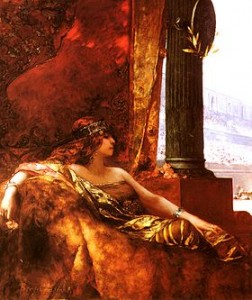Let me start off by saying that I have THE BIGGEST historical badass lady crush on Empress Theodora. Honestly, if I could travel back in time, murder Emperor Justinian, and take his place, I wouldn’t think twice. Now that we’ve established my undying love and my willingness to commit murder for the sake of a woman who died over a thousand years ago, let’s get to the history:
The Byzantine Empire rose from the ruins of what used the be the Eastern Roman Empire after the fall of Rome itself in the 5th century C.E. Byzantium was a powerful empire which encompassed much of Eastern Europe and Asia Minor, and lasted from the 5th century all the way up until 1453. During the height of the realm’s power and prosperity in the 6th century, Byzantium was overseen by one power couple whose adept leadership brought about the splendor of the empire in its heyday: Justinian and Theodora. The ancient Beyonce and Jay Z, one might say.
Theodora was by no means born into power though she rose into it, which was an extremely rare phenomenon in ancient ruling classes. In fact, Theodora harbored a pretty questionable past. We think she was born around 497 C.E., but so insignificant was her birth in history’s eyes that we can’t be completely sure. Theodora was the daughter of a bear handler at the Hippodrome, which was the huge stadium at Byzantium’s capital city, Constantinople (modern day Istanbul, Turkey), where the populous would gather regularly for athletic and artistic entertainment. When her father died and left her bereft as a child, Theodora became an actress at the Hippodrome to support herself.
The thing about the occupation “actress” back then? “Actress” was basically synonymous with “prostitute” or “whore”. Theodora performed in what equates to modern burlesque shows at the Hippodrome, and after the show she served as a courtesan for some of the empire’s most powerful men. As she grew older, Theodora’s charm and sharp wit made her an extremely popular and successful stage actress.
When Justinian met her, Theodora was a simple seamstress who spent her days spinning wool, but so captivating was her personality and so extraordinary her beauty that he immediately fell head over heels for her. At the time his uncle was emperor, and there were laws in place prohibiting any high military official from marrying anyone who worked as an actress because of their work as prostitutes and their low social status. As soon as his uncle passed away and Justinian ascended to the throne, however, he abolished the law and married her, making her his co-regent. Get you a man who would change laws for you and make you his queen, amiright ladies?
Theodora soon proved to be much more than just a pretty arm ornament for the emperor. She had a sharp mind for politics, and was extremely clever and displayed progressive beliefs far advanced for her time. She was a strong advocate for women’s rights in her empire, and passed legislation imposing harsh punishment for rape (some of the first of its kind), legislation giving women more rights in the event of a divorce, and legislation banning pimps from earning money from prostitutes and brothels in the empire’s major cities. She also created and funded a house for former actresses and prostitutes to rehabilitate after they quit their jobs. Yaaas *literal* queen.
Furthermore, Theodora’s political acumen literally saved the kingdom on multiple occasions. During the Nika Revolt in 532, Justinian and all of his experienced male advisers were on the verge of calling it quits and simply escaping Constantinople with their lives while massive crowds stormed the city calling for revolution. Theodora, however, was having none of this. She gave the following badass speech to her husband and his advisers:
“My lords, the present occasion is too serious to allow me to follow the convention that a woman should not speak in a man’s council. Those whose interests are threatened by extreme danger should think only of the wisest course of action, not of conventions. In my opinion, flight is not the right course, even if it should bring us to safety. It is impossible for a person, having been born into this world, not to die; but for one who has reigned it is intolerable to be a fugitive. May I never be deprived of this purple robe, and may I never see the day when those who meet me do not call me empress. If you wish to save yourself, my lord, there is no difficulty. We are rich; over there is the sea, and yonder are the ships. Yet reflect for a moment whether, when you have once escaped to a place of security, you would not gladly exchange such safety for death. As for me, I agree with the adage that the royal purple is the noblest shroud.” *DROPS MIC*
Her speech was so persuasive that Justinian rallied his troops and called them to slaughter all the rioters, preserving their reign for several years to come. She became Justinian’s most trusted and influential adviser, and ruled beside him as an equal. At one point, when Justinian became so sick with the Black Plague that he was unable to rule, she became the sole ruler of the empire until his recovery.
Upon her death of cancer in 548, Justinian was extremely distraught, and he wept bitterly at her funeral, refusing food and drink for days. Accounts say he was never the same after the loss of his love.
Theodora’s inspirational story shows us that, though we may not be able to choose where we come from, we can certainly choose where we are going. “There is no force equal to a woman determined to rise.” -W.E.B. Dubois

i really like this essay. i am doing a reserch paper on strong woman and this helped me alot. thanks 😀
what is a “wore”? what did she do? is she a qualified christian for that?